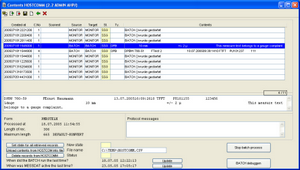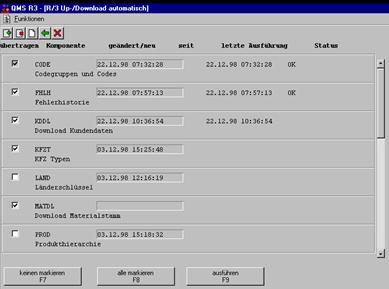Interfaces to ERP Systems
The modul iQ-INTERFACE consists of a variety of interfaces between iQ-Basis and usually higher-level ERP and material management systems. The data transfer is handled using standard communication systems.
The individual interface tables include almost all fields of iQ-Basis, which are relevant for a data exchange. If on the other hand some fields are not known in the program on the higher level it will result in functional restrictions of iQ-Basis.
Since most ERP systems are not familiar with quality assurance from an IT perspective, the availability of important quality information is limited. So iQ-Basis has to work self-sustaining from ERP systems. The most economical way of integration is to get the information independently by reading directly from the tables of the ERP. We are able to do this because we have the means to handle several databases on different hardware platforms simultaniously.
Communication
- Use of all popular communication techniques
- Various kinds of data exchange
- Online transaction-oriented
- Synchroniously or asynchroniously via tables
- With relational and hierarchical databases
- Asynchron only by using ASCII files
- Distributed reponsibilities concerning the ASCII file management
- Reaction in case of erroneous transfers due to
- Communication failures
- Non-processable data
- Repeated transfers of identical records
- SAP: Remote function call; Uniface also supports BAPI
Supported ERP Systems
- SAP R/3;
- MM: material, business partner, deliveries, use decisions
- QM: quality messages, failure catalogs
- PM: gauges (equipments)
- SAP R/2; RM-Mat, RM-QSS
- INFOR AS, INFOR Global Solutions
- BaaN
- Dialog Total, BOG
- Several individual ERP systems
The Transfer Monitor

- Running as a batch process on any computer in the network
- If one computer is not active, another temporarily stores all data to be sent, until the other is available again.
- Incorrectly transferred records are marked as faulty.
- Record troubleshooting; records that can be repaired using the monior can be reactivated to be processed by the background process.
- Display of all records sent or received
- Content editing
- Processing logs
- Simultaneous handling of different systems (ERP, CAD etc.)
Overview of the Most Important Interface Data
Partners
- Site address, contact persons
Material
- Master data
- Product groups
- Revision state of material
Inspections plan:
Using these interface formats inspection plans can be generated automatically- By importing aged data from to be replaced systems
- By a CAD system, e.g. for initial inspection plans
- By NC-controlled measuring automats directly from the measuring program
- Inspection plan header
- plan versions
- inspection operations
- attributive characters
- variable characters
deliveries
- booking of deliveries, generation of inspection orders made automatically
- initial inspections
- purchase order information
- serial numbers, charge identification
- cacellation of deliveries
- use decision after inspection
plant organization
- plant, production areas
- cost center
- worker
plant maintenance
- master files of equipment
- spare parts
- operation plans, versions
- spare parts and tools for operations
- security measures
SAP R/3 tables
Varios iQ-Basis modules are working together with SAP R/3- event controlled receiving inspection
- situations oriented maintenance and empirically based
- audit system
- gauge management system
- customer complaint management
- Q-project management

SAP R/3 data transfer
- remote function call; RFC
- Business Application Interface; BAPI
- IDOC
- all R/3 developments with ABAPs made by AHP
- data received from R/3
- stock master file
- failure groups and codes
- Q-messages
- plant information
- country keys
automotive supplements
- car types
- defect history
- verios new tables
- data sent to R/3
- Q-messages
- use decisions